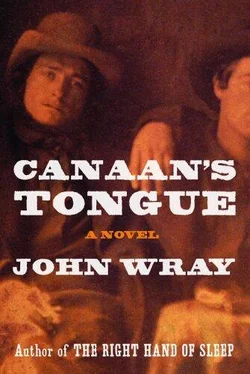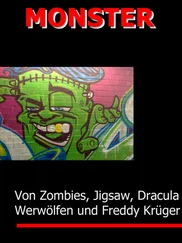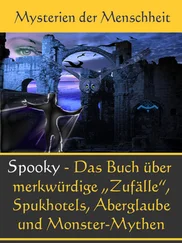Once her appetite had calmed, however, Anne’s face took on a dull-eyed look whenever I was near. The gifts and indulgences continued unabated, but there was an equivalence now between each trinket and the night that followed—: if I’d benefited from her largesse I could be sure that some particular demand would be made of me. I began to fear her, and to escape the house whenever I was able. The purpose of our evenings became less and less the satisfaction of Mother Anne’s body than the degradation, the reduction to mud and river-water, of my own.
Once a week, usually on a Sunday, she’d take me down to the cellar, where the whiskey-still was housed, and pull aside an ancient, sodden curtain. Behind it was a narrow alcove—: the walls had a sweet, rancid smell, as though tallow had been rendered there. Anne would undo the silk bandanna she’d taken to tying around my neck, bind my wrists together with it, then attach them to a hook set high into the wall, so that the balls of my feet barely touched the packed-earth floor. Then — cautiously at first, with great affectation of shyness — she’d commence to undo my britches. Once I was stripped and arranged to her satisfaction, she’d take a step backwards and mutter to herself awhile. As she stood there (her lips and jaw working soundlessly, as though she were a toothless beggar chewing on her tongue) she’d work her right hand up under her skirts, then bring it out again, glistening with her sex, and run it back and forth across my face. Within the space of a few breaths, no matter how furiously I pleaded with my blood and bowels, my body would stir in answer. All I could do then was to let my eyes fall closed. At such moments the world contracted into a coal-black pellet, the merest flake of cinder, and I’d watch dispassionately as my body fell away from Mother Anne, away from the house, into an infinite, ghost-like Mississippi. I prayed to Heaven that I would drown in it.
Whenever I could escape from the house (when Anne was tending to her husband, for example, or in the early morning, before she rose from bed) I’d walk the half-mile out to the Mississippi and ease myself into the thick, brown water, at times not even troubling to remove my clothes. My sole wish was to blend in with the river whose color so precisely matched my own—: to vanish into it irreversibly. I’d gulp down great mouthfuls as I swam, picturing the silt passing into my muscles and my blood until my entire body was converted into sediment. I would become as inhuman as the river was, as indifferent, as life-giving, as adored. The river itself was a mulatto, after all—: a hybrid born of the flowing together of three rivers to the north. It would consume my body, given time, as it did the muddy banks that held it. I would carry the filth of millennia inside me and remain pure.
Occasionally, as I lay on the sun-warmed pier, my river-dream would give way before the image of a spectral, gray-faced stranger (sometimes a man, but more commonly a woman) who would appear without warning, like a bolt of stray lightning, and rescue me with one emphatic act of violence. This vision grew more dear to me each time it arrived—: more comforting, more life-like, more extreme. I began to wonder whether I might not carry this faceless, sexless liberator inside of me, and began, painstakingly and cautiously, to conceive a plan of emancipation and escape. Providence, however, had already decreed that my wish be granted to the letter. My liberator was a man of flesh and blood, and he was bearing down on Mother Anne’s house with all practicable force and speed.
It happened, as chance (or Providence) would have it, on a Sunday. Dusk was falling, and still Anne hadn’t come for me—; I lay rigid and unmoving on my cot. She had never waited so long before. I permitted myself, for the briefest of spells, the luxury of imagining she’d forgotten me. Soon enough, however, I heard her deliberate, heavy foot-falls on the stairs—; a moment later she was guiding me down the hall. Her husband let out his customary warble of despair as we passed his door, propped open, as usual, with an empty mash-bucket. At the head of the stairs the idea came to me, fleetingly and sweetly, of tipping her head-first over the banister—; but I kept passive as a stone. I followed her mutely down the cellar steps, past the filthy, grease-markedcurtain, into that hateful alcove. I turned and raised my hands for her to bind them.
“Not today, Oliver,” Anne said, her voice high and lilting. It was not a tone I’d heard her use before. She held the bandanna at a distance, as though it were the carcass of some small animal of the field. (Her eyes, too, were more far-away than usual, her face more impassive.) Suddenly her eyes recovered their sharpness, as though a veil had been pulled from them. Her voice fell and roughened. “Turn your self round, boy. Lay your face against the brick.” I hesitated, unsure of what she wanted—; the heel of her right hand struck me hard across the chin. When my vision cleared I found myself positioned as she’d directed, my hands held out behind me, my right cheek flush against the wall.
“Cross your wrists above your head. There. Hold them up! Higher, boy.”
It had always been important to her to see my face. I shut my eyes and did as I was told, trying to think of nothing but the river.
“Right,” Anne said morosely, binding my wrists together. “Right.” Her work-chipped finger-nails slid across my brow, lingering there a while—; in spite of myself I let out a sigh as she withdrew them. The world had already begun dwindling away to nothing, to a grain of jet-black coal. Anne was somewhere to my left, perhaps a half a pace behind me. She stripped herself with a few coarse movements, then hurriedly undid my britches and pulled them to my knees. Her right hand planted itself at the base of my spine. I sank my teeth into my lower lip and waited.
Before Anne could act, however, a foot-fall sounded on the cellar steps. After a pause it was followed by another, then a third. Anne stopped short and dug her nails lightly into the small of my back—: a warning to me to hush. As yet the curtain kept us hid.
Nothing happened for a time. Anne struggled to keep her breathing steady, and I, for my part, kept as quiet as a mole. She could do nothing, however, to keep from shivering in her nakedness. The rings of the curtain rattled tinklingly together.
“Annie Bradford? Am I right?” came a voice. (A thick voice, clumsy with its consonants—: the voice of a drinker.)
“Missus Anne Bradford,” she answered, her voice steady and severe. “Who the hell are you, sir, to come into my house?” She let go of my nape, now, and crouched to gather up her clothes.
The man proceeded down the steps.
“Hold there! Hold!” Anne shrieked, stamping her bare foot against the floor. “I’m entirely as nature made me, sir!”
“So are we all, Annie,” the man said sadly, stepping off the stairs. What I’d mistaken for clumsiness was in fact some manner of dialect—; he wasn’t a Dixie man at all, perhaps not even an American. He was no more than three steps from the mash-kettle now, and eight or nine steps from the curtain.
“I don’t much enjoy trading how-dos with a muslin sheet, Mrs. Buh, Buh, Bradford,” he said. He sounded crest-fallen, apologetic. “What say you come out, as is, and I avert mine eyes?”
“Get you gone from this house,” Anne said in a hiss. Her breath came whistling against my nape. “Get you gone, sir, before I call my husband—” (here she took in a frantic, gasping breath, but so quietly that only I could hear it)—“or my boy.”
Читать дальше












